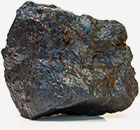Magnetite Aids in Fertilizer Synthesis
Iron ore also plays a vital role as a micronutrient for crops

In order to feed the more than 7 billion people on the planet, the markets rely on industrial agriculture to crank out acre after acre of high-yield, high-value crops. In order to accomplish this feat, agricultural operations require vast quantities of fertilizers and nutrients in order to maximize crop outputs.
Magnetite serves a vital role in the world’s food chain. Whether it’s as a catalyst for the production of fertilizer or as a micronutrient added to the soil to provide just a little boost of iron to young crops, magnetite’s role in agri-business is continually growing and evolving.
Fertilizers made possible through magnetite
A core component of many industrial fertilizers is Chelated Iron and Iron Sucrate. Magnetite is a key component in the production of these two products. Chemical engineers can also introduce quantities of magnetite to the reactions that release ammonia, and magnetite again acts as a catalyst for the capture of ammonia. Without ammonia, many fertilizers would be useless. And without magnetite to act as a catalyst, the production of ammonia would be a far more expensive and potentially more dangerous occupation.
Yet, with magnetite, the production of ammonia is rendered safer and faster, improving output and the quality of fertilizers in the field. Without magnetite, many fertilizers in use today would never have seen the marketplace.
Enriching soil and bolstering crops with magnetite
In addition to its role as a valuable catalyst in a host of reactions, magnetite also makes an effective and efficient micronutrient that, when added to the soil, provides young plants an added boost of iron and oxygen.
Many plants rely on a steady supply of iron to grow healthily, to produce fruit, or to improve uptake of the fertilizers that improve crop yields. When magnetite is added to soil, it can produce more robust crops with stronger, nutrient-rich soil.
Request more information about Agriculture, Fertilizer & Micronutrients
A friendly Quality Magnetite customer service representative will be in touch to discuss your inquiry

